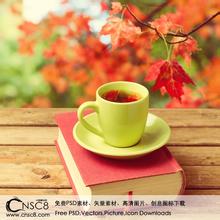The History of Coffee planting in China when did Yunnan grow coffee?
Chinese coffee beans
It was about this period that kasu was brought into the Central Plains by businessmen through the Western regions via the Silk Road and officially entered China's field of vision. On a piece of bamboo slips excavated from the Han Dynasty beacon site in Huahai, Gansu Province, there is a list of materials provided by Qiuci merchants when they declare customs through Jiuquan, including kasu.
Kasu was originally called "bitter boil" in the Han Dynasty, referring to its taste and processing techniques, followed by synonyms such as Chisu and Kunlun fruit, as well as the name Jiasu, which was used in later generations. Su studied its exegesis, "Shuo Wen Jie Zi", Su Congyi; "Xiao Erya wide name" said: "death and resurrection is called Su", "Guang Yun" said: "Su, rest, death and rebirth." Kasu has the effect of turning people from fatigue to excitement, so it is called "Su". Praise the good for those who are good.
Jiasu was introduced into China early, but the Central Plains climate is not suitable for Jiasu planting, can only rely on the introduction of the Western region, the quantity is very small, and the price is expensive, can only be spread as a rare and precious medicine in the upper layer. Its real popularity is closely related to Ma Yuan, the general of Fubo in the Eastern Han Dynasty.
When it was built at the beginning of the Eastern Han Dynasty, Wang Kangxian of the Western region actively requested the attachment and reset the protection of the Western regions, and the emissaries kept on the road. In the nine years since the founding of Wu, the famous generals Ma Yuan and Lai she led the generals to pacify Liangzhou and had a series of fierce battles with the Qiang people, which was in line with the interests of the Western regions to reopen the Silk Road. It is possible that during this period, Ma Yuan received gifts from King Shache in the Western region (when Kang had died of illness and his son Xian succeeded to the throne) and from businessmen, including Jiasu.
Ma Yuan loved Jiasu very much and boasted in front of Dou Rong: "I have Kunlun fruit, which can defeat thousands of people."
This is the first time that the existence of kasu has been explicitly mentioned in Chinese history books. Its magical refreshing effect is considered by Ma Yuan to be a divine fruit from the Kunlun Mountains. The Book of the later Han Dynasty said that Ma Yuan was shot through the shins in the battle, and Judas fought to the death. At the end of the night, the soldiers were all excited and the enemy was broken. The emperor worked hard with the seal book. " Maybe it's just drinking the effect of Kasu.
In the seventeenth year of Guangwu Jianwu, Zheng Bian and her sister rebelled against each other. Ma Yuan was ordered to fight the insurgency. With miasma, it is difficult for soldiers and horses to do so. Ma Yuan made two measures: one was to order the army to eat barley to get rid of barley, and the other was to try to plant the Kunlun fruit he carried with him. The hot climate of cross-toe is suitable for Kunlun fruit growth. Ma Yuanping's rebellion lasted for three years, during which the Kunlun fruit planting experiment was successful. Ma Yuan was very happy and ordered to promote popularization in the local area. "Aid stations often govern the city walls of counties and counties, irrigate through canals, and persuade farmers to plant fruit for the benefit of their people." And set up bronze columns to demarcate the Han boundary.
When Ma Yuanban returned to Korea, he loaded two carts of Coix seeds and Kunlun fruit and brought them back to the Central Plains. At that time, the courtiers and aristocrats thought that they were the treasured products of the south and were very jealous, but because Ma Yuansheng was Zhenglong, no one dared to speak up. After Ma Yuan's death, someone wrote that he had brought back pearl-colored rhinos from the south, and that he saw a piece of red on the car, which must be jade and so on. The son of Heaven was furious, and Ma Yuan's family was frightened and uneasy, and wanted to write a letter to explain that there were only Coix seeds and Kunlun fruit in the car, and red was actually the color of Kunlun fruit. Hou Yu told them that Kunlun is a sacred mountain. Ma Yuan secretly hid the divine fruit and intended to live forever, but he would also be framed by people with ulterior motives. He will ask the Ma family to grind the treasured Kunlun fruit into powder and rename it Jiasu to dedicate it to the son of Heaven.

Important Notice :
前街咖啡 FrontStreet Coffee has moved to new addredd:
FrontStreet Coffee Address: 315,Donghua East Road,GuangZhou
Tel:020 38364473
- Prev

Instant coffee encounters challenges Can new products such as capsule coffee help Nestle?
Coffee is coming home. Juerg Zaugg, Nestle SA's director of agricultural services for Greater China, holds a cup of Dolce Gusto Yunnan limited edition espresso coffee and banters with local coffee farmers at a coffee farm in the mountains of Puwen Town, Xishuangbanna Dai Autonomous Prefecture, Yunnan Province. In September this year, a limited edition of Yunnan local coffee beans
- Next

Detailed tutorial steps of Coffee extraction Video introduction to Yunnan Price of China Coffee Network
The coffee extraction mocha pot, also known as the Italian coffee pot, is a three-layer stove. After boiling water in the bottom layer, the coffee powder is pushed through the middle layer by steam pressure to enter the upper layer, and the coffee concentration obtained is comparable to that of espresso, but there is no oil slick, but if a pressurized gasket is installed at the coffee spill outlet, the golden crema can be extracted. Mocha kettle and semi-automatic concentration
Related
- Unexpected! Ruixing Telunsu lattes use a smoothie machine to foam milk?!
- % Arabia's first store in Henan opens into the village?! Netizen: Thought it was P's
- Does an authentic standard mocha coffee recipe use chocolate sauce or powder? Mocha Latte/Dirty Coffee/Salty Mocha Coffee Recipe Share!
- What is the difference between Vietnam egg coffee and Norway egg coffee? Hand-brewed single product coffee filter paper filter cloth filter flat solution!
- What is the difference between sun-cured and honey-treated coffee? What are the differences in the flavor characteristics of sun-honey coffee?
- How to make Italian latte! How much milk does a standard latte use/what should the ratio of coffee to milk be?
- How to make butter American/butter latte/butter Dirty coffee? Is hand-brewed coffee good with butter?
- Is Dirty the cold version of Australian White? What is the difference between dirty coffee/decent coffee and Australian white espresso?
- Relationship between brewing time and coffee extraction parameters How to make the brewing time fall to 2 minutes?
- Got entangled?! Lucky opens a new store, Mixue Ice City, and pursues it as a neighbor!

